
Vijay Kanuru on translating his research on nanoparticles into a successful business.
Nanoparticles can penetrate any site of the body, even neurons. It means we can deliver drugs straight to cancer cells so the healthy cells are not affected.
Vijay Kanuru
Vijay Kanuru [2006] is just about to expand his nano-drug development firm in the UK after success in India. Oncocur Limited develops nano-drugs to fight cancer and builds on Vijay’s PhD research into nanoparticles. He says: “Cancer is growing across the world. There are two main challenges: the toxicity of treatments and the fact that cancers are becoming drug resistant. Nanoparticles can penetrate any site of the body, even neurons. It means we can deliver drugs straight to cancer cells so the healthy cells are not affected.”
Now he is collaborating with his PhD thesis internal examiner Professor Andrew Wheatley in the Department of Chemistry. Vijay first became interested in enterprise at Cambridge, through attending Judge Business School workshops and has since launched two business, of which Oncocur is the latest. “Cambridge offers you a broader education than just the subject you are studying. It helped me develop a methodology of learning and how to approach the problem,” he says.
Oncocur has five team members, including chemists, biotechnologists and pharmacologists. Its business model involves discovering drugs to fight cancer and developing intellectual property. It is not the normal one for medical enterprises in India which focus on manufacturing rather than developing new drugs.
That is why he is returning to the UK next year to expand Oncocur with venture capital funding. He is also in talks with the Welsh government. He has drawn on his Cambridge network, including Gates Cambridge contacts, to develop the business. He returned to Cambridge this summer for the Gates Cambridge Biennial where he linked up with fellow alumnus Dan Greenfield. “It was very productive and cross disciplinary. Gates Cambridge is such an active community and the quality of people is so good,” says Vijay.
A desire to learn
He says his interest in scientific enterprise is part of “an intrinsic desire to learn”. Vijay was born and grew up in a village near to Guntur in Andhra Pradesh state in south eastern India. He comes from a family of farmers and was the first person in his family to get a university degree. Brought up by his grandparents, he says both his family and himself were very aspirational and that from an early age he dreamt of going to Cambridge, having read about scientists who studied there.
As a child he was passionate about cosmology and physics and was a top student in his school, but he gradually moved over to physical chemistry as he grew older since that was a more realistic course of study in India.
Vijay did his undergraduate degree at Nagarjuna University in Guntur followed by a two-year MSc in Chemistry at the University of Pune in Pune. Right from the start of his master’s Vijay started doing research, something he had always wanted to do since he was a child. Before he finished his course he had published a paper in an international journal on his work on how nanoparticles can accelerate chemical reactions.
He applied to two departments in Cambridge to do his PhD and was offered a place in both.
Nanoscience
He chose to do his PhD in Chemistry with the support of a Gates Cambridge Scholarship and began in autumn 2006. However, just before he arrived his supervisor moved to the University of Oxford. That meant Vijay had to revise the focus of his PhD. “I chose to combine surface physics and nanoscience to try and understand how nanoparticles work as catalysts of chemical reactions and underlying mechanism of nanoparticles' surface reactivity. It meant I had to learn new things which I enjoy,” he says.
It also led to a new theory regarding the role of nanoparticles as catalysts which is now generally accepted. Previously, it was thought that nanoparticles were a precursor to real catalysts for chemical change. Vijay’s research showed nanoparticles themselves could be catalysts. It examined the surface mechanism of bond formation on metal nanoparticle surfaces during catalysis. The process is central to the design and development of efficient materials for environmental and medicinal applications.
By the time he finished his PhD he had published two papers in peer reviewed journals and won several awards, including the Young scientist award of the International Association of Catalysis Societies and the Lowry prize for the best PhD work in his department.
While he was at Cambridge he became very involved in the Gates Cambridge community. He was on the Gates Cambridge Scholars Council, later joining the Board of the Gates Cambridge Alumni Association and hosting two events in India, including the Gates Cambridge Emerging Leadership Summit in 2013. He has also been a Gates Cambridge ambassador, visiting universities in India to speak about the scholarship. “I’m an ardent Gates guy,” he says.
In fact, he says when his PhD finished he didn’t want to leave Cambridge, in large part because of Gates Cambridge. He moved to Cornell to do a post-doctorate focused on how nanoparticles – including nano alloys and carbon nanomaterials – can be used for fuel cells and batteries.
While he was in the US, Vijay had to travel back to India for his sister’s wedding and during his trip he was invited by his former supervisor at the National Chemical Laboratory Pune to give a keynote speech about nanotechnology opportunities for industry. He had good feedback from business people who felt the time was right to invest. He started his first company, Applied Nanomaterials Pvt Limited, which makes nanoparticles more cost effective so they can be commercialised. His business partners had years of experience in the business world and were on the point of retiring.
Vijay, whose role is now more that of a CEO than a scientist, says being an entrepreneur has been a rollercoaster. “You need a knowledge of science and technology and an awareness of commercial aspects such as marketing and communications,” he says. “You also need to believe in yourself and be able to inspire others.” It is a role which has required him to keep learning new things in keeping with his early thirst for knowledge.
Picture: cancer cells from Wikimedia Commons

Vijay Kanuru
- Alumni
- India
- 2006 PhD Chemistry
- Fitzwilliam College
Dr Vijay Kanuru is a leading nanomedicine inventor and a prolific nanotech innovator turned entrepreneur, who is on a mission to conquer lethality of cancers with advanced bio-nanotechnologies and artificial intelligence. He spearheads a highly interdisciplinary translational clinical research work in order to commercialize next generation revolutionary nanoparticle medicine for the advanced cancer care, cancer prevention and early stage prognostic cancer treatments. He has made pioneering contributions in developing over the counter therapeutic grade oncolytic nanoceuticals, clinical onco-nutrition and disruptive pharma food products which has made a difference to thousands of lives including cancer patients . He is committed to education,mindfulness and innovation as he believes these three elements are critical for human advancement and environment sustainability.
Previous Education
Stanford University Professional certificate in "sustainable energy conversion and storage"
University of Cambridge PhD in Chemistry
Links
http://www.oncocur.in
http://www.drvijaykanuru.in
https://www.linkedin.com/in/vijay-kanuru-883aa735












